The Leopards of Zaire return from the 1974 World Cup in Germany
In February 2022, the association "Le lien culturel Africains.e.V" of Germany organised the players' visit to Germany and contacted us. Retrofootball offered them the historic jersey to commemorate their participation in the 1974 World Cup...
The excitement of this meeting was at its peak with three members of Zaire's national team playing the World Cup in Germany; The midfielder Kibonge Mafu, born in 1945 in Kinshasa, who was called the "Lord of Football" and captain of the club AS Vita of Kinshasa, one of the best players of the 60s and 70s in Africa with an elegant game and with great discipline and leadership skills, the striker Mayanga Maku born in 1948 and who scored 12 goals in the African Cup of Nations, player of the Vclub like his teammate and resident in Belgium. In 2006 he was voted by CAF as one of the 200 best African footballers of the last 50 years. And Raymond Buhanga Tshimen born in 1949, the vice-captain of the Leopards, a player of the TP Mazembe club of Lubumbashi and who in 1973 received the African Golden Ball, a title awarded by France Football to the best players in Africa and which was replaced in 1995 by the African footballer of the year award and won by players such as Samuel Eto'o or Didier Drogba.
During the visit, the Leopards met the mayors of Dortmund and Gelsenkirchen, where Zaire's matches were played during the World Cup.
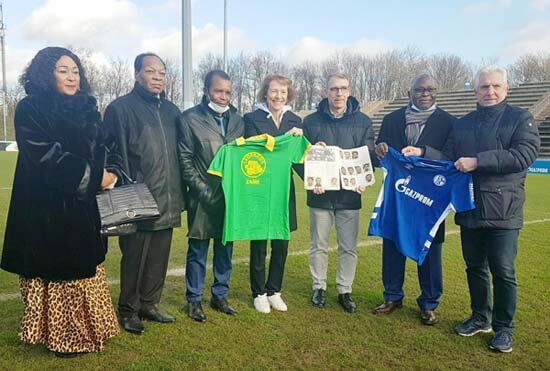 Visit of Zaire players to Germany. Photos kindly provided by Malungu Donaly who organised the event.
Visit of Zaire players to Germany. Photos kindly provided by Malungu Donaly who organised the event.
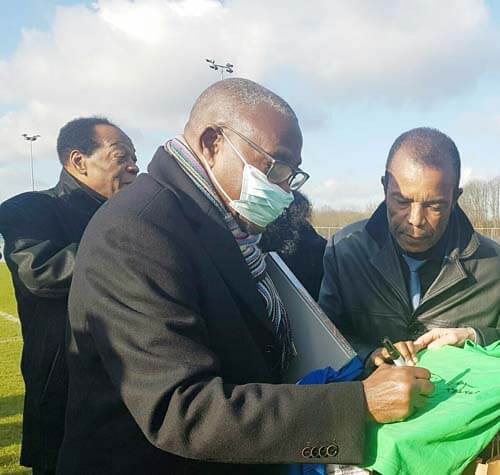
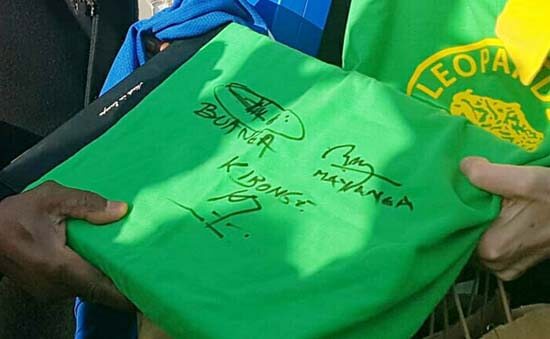
Shirt signing by Zaire players during their visit to Germany. Photos kindly provided by Malungu Donaly who organised the event.
Hear the roar of the legend of the Zaire and Leopard players? We tell you about it below.
1974 World Cup
Let's go back to 1974. To orient ourselves in time, in the year 1974 the first personal computer was marketed, the president of the United States, Nixon, resigned because of the Watergate affair and the arrival of Spanish democracy was at the doorstep as General Franco died in 1975... and even the World Cup was played in West Germany.
The first phase of the 16-player World Cup was played in four groups. The best teams in the world participated, including Brazil, Germany, Uruguay, Argentina, Italy and the Netherlands. We do not find the great teams that have written the history of football, such as France or Spain.
The second phase is also played in 2 qualifying groups with the first two of each group qualifying to play the final and the second two to play the match for third place.
The Polish national team won the match for third place - 0-1 - against Rivelino and Jairzinho's Brazil, a team that had won the 1970 World Cup in Mexico and with this World Cup ended the heyday of Pele's Brazil. Poland's goal was scored by one of the great Polish football legends of all time, Grzegorz Lato, winner of the Golden Shoe.
Beckenbaueur's Germany, who were taking their first steps, would face in the final the Netherlands of Cruyff and Neeskens, who would take the lead in the match and came from a win over Brazil in the semi-final. Germany came back with Müller's late goal to win 1-2 and claim a much-appreciated victory as hosts - their second World Cup title.
This would be the summary story of the World Cup... the story of the big winners, but the other stories are missing, the little big stories without which football would be orphaned and we would dare to say without its essence, which is nothing more than the sporting participation of effort, the epic of the lesser known teams without which football would literally not exist, the cantera where so many players and legends were born, or communities of fervent and dedicated fans like those of the great national or club teams.
Zaire, the first African team to play in a World Cup in 1974
The Leopards of Zaire were the African team that made history at the 1974 World Cup, being the first team from Central Africa to qualify for the World Cup.
To qualify for the World Cup, this team from Zaire, now known as the Democratic Republic of Congo, had to beat African powers such as Ghana and Cameroon, as well as Morocco, in the qualifying round. But Zaire is a team that had its footballing heyday from the late 1960s to the mid-1970s. They won the African Cup of Nations in 1974 after beating Zambia 2-0 in the final and winning the semi-final against Egypt 2-3; Egypt is the nation that has won the African Cup of Nations the most times.
This 1974 African Cup of Nations victory was Zaire's second, having won the tournament six years earlier in the 1968 championship in Ethiopia.
Knowing today that Zaire have not won another African Cup of Nations since then, and that they had to wait until 1995 to qualify third in both the 1998 African Cup of Nations in Burkina Faso and the 2015 Africa Cup of Nations in Equatorial Guinea, we can understand that those triumphant years were golden years for Democratic Republic of Congo football.
African football - The records of the African Cup of Nations winning teams:
We would like to take this opportunity to take a look at the winners of the African Cup of Nations:
1.- Egypt with 7 victories in 1957, 1959, 1986, 1998, 2006, 2008 and 2010.
2.- Camerún with 5 vittorie in 1984, 1988, 2000, 2002 e 2017.
3.- Ghana with 4 vittorie in 1963, 1965, 1978 y 1982.
4.- Nigeria with 3 vittorie in 1980, 1994 y 2013.
5.- Ivory Coast with 2 triumphs in 1992 and 2015.
6.- Argelia with 2 triumphs in 1990 e nel 2019.
7.- RD Congo (Antiguo Zaire) with 2 triumphs in 1968 and in 1974.
(DR Congo is in seventh place for achieving fewer second and third places than Ivory coast and Algeria).
To date, the DR Congo national team is in 66th place in the FIFA National Team Ranking.
Let's go back to the 1974 World Cup. At that time, the journey of Zaire's football team was not an easy one.
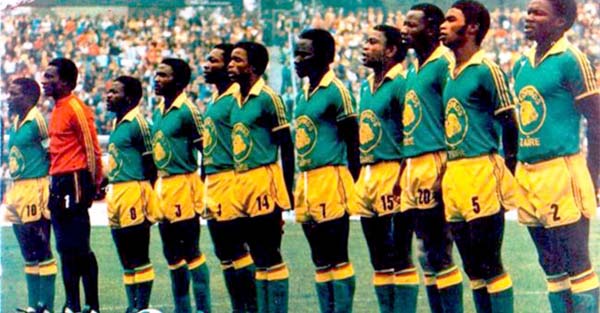 Zaire team in the 1974 World Cup in Germany.
Zaire team in the 1974 World Cup in Germany.
They played in Group B in the group stage against none other than Brazil and also against Scotland and Yugoslavia. Their first match and World Cup baptism was against Scotland at the Westfalenstadion stadium in Dortmund on 14 June 1974. The match ended 0-2 with Scotland winning, with the African team playing a good game. Zaire stumbled against Yugoslavia where they lost 9-0 six days later at the Parkstadion in Gelsenkirchen. Interestingly, Zaire's coach was Yugoslavian national Blagoje Vidinic. Apparently there were pressures and financial problems and the players went on the pitch under pressure and not very focused on the game because of issues that had nothing to do with sporting matters.
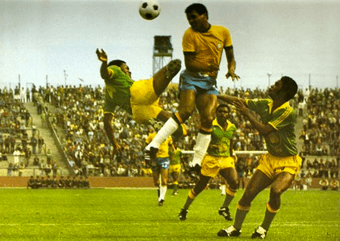 Zaire-Brazil match during the 1974 World Cup
Zaire-Brazil match during the 1974 World Cup
After the disaster of the match against the Yugoslavs, the players were alarmed at the possibility of being ridiculed in the match against the ever-feared Brazil; however, they went on to a respectable 0-3 defeat. According to the players that year, there was no shortage of pressure; Zaire was ruled by dictator Mobutu who had staged a coup in 1960 and ruled Zaire in an iron-clad manner. He had pinned high hopes on the team and also put great pressure on the players to come back with a decent result. The pressure reached its peak before the game in Brazil where it seems that the players received threats to their lives if they lost by more than four goals. These threats went unnoticed by the media and therefore we want to focus on the comical part of the episode involving defender Ilunga Mwepu in the face of the defeat to Brazil, which is always reported as a surreal event, but on the extra-sporting conditions of pressure that the players were subjected to and which certainly justify what happened.
The Leopards achieved qualification thanks to the serious and efficient work of their Yugoslavian coach Blagoje Vidinic and the commitment and dedication of their players who were sought after among the best in the country. Hailed as heroes when they ventured to the World Cup in Germany, completely abandoned when they returned; Mobutu seems to have prevented that. We at Retrofootball want to remember their exploits in that German World Cup and pay them a heartfelt tribute.
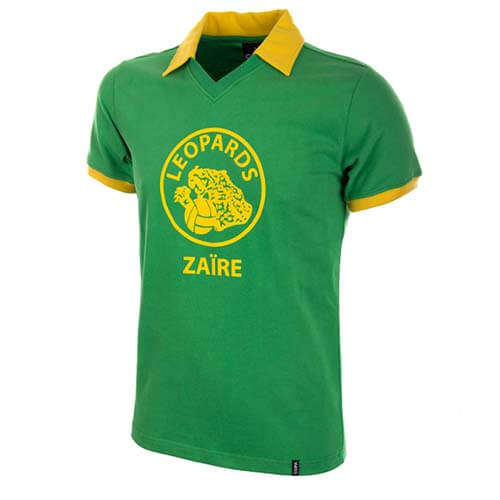
As the best celebration of these glories of African football, we include the jersey they wore in these matches, a beautiful garment showing the leopard, symbol of the Zaire team and the roar of its players and supporters.
 Retrofootball
Retrofootball  Belgium
Belgium  France
France  Germany
Germany  Italy
Italy  Portugal
Portugal  Spain
Spain  Switzerland
Switzerland  United Kingdom
United Kingdom  other countries
other countries  Retrorugby
Retrorugby 
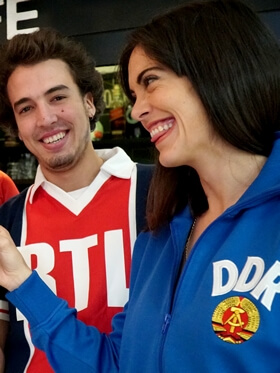





Post Comments